
A Legend of Old Egypt
Encyclopedia

Polish language
Polish is a language of the Lechitic subgroup of West Slavic languages, used throughout Poland and by Polish minorities in other countries...
: "Z legend dawnego Egiptu") is a short story
Short story
A short story is a work of fiction that is usually written in prose, often in narrative format. This format tends to be more pointed than longer works of fiction, such as novellas and novels. Short story definitions based on length differ somewhat, even among professional writers, in part because...
by Bolesław Prus, originally published January 1, 1888, in New Year's supplements to the Warsaw
Warsaw
Warsaw is the capital and largest city of Poland. It is located on the Vistula River, roughly from the Baltic Sea and from the Carpathian Mountains. Its population in 2010 was estimated at 1,716,855 residents with a greater metropolitan area of 2,631,902 residents, making Warsaw the 10th most...
Kurier Codzienny (Daily Courier) and Tygodnik Ilustrowany (Illustrated Weekly). It was his first piece of historical fiction
Historical fiction
Historical fiction tells a story that is set in the past. That setting is usually real and drawn from history, and often contains actual historical persons, but the principal characters tend to be fictional...
and later served as a preliminary sketch for his only historical novel
Historical novel
According to Encyclopædia Britannica, a historical novel is-Development:An early example of historical prose fiction is Luó Guànzhōng's 14th century Romance of the Three Kingdoms, which covers one of the most important periods of Chinese history and left a lasting impact on Chinese culture.The...
, Pharaoh (1895), which would be serialized in the Illustrated Weekly.
"A Legend of Old Egypt" and Pharaoh
Pharaoh (novel)
Pharaoh is the fourth and last major novel by the Polish writer Bolesław Prus . Composed over a year's time in 1894–95, it was the sole historical novel by an author who had earlier disapproved of historical novels on the ground that they inevitably distort history.Pharaoh has been described...
show unmistakable kinships in setting
Setting (fiction)
In fiction, setting includes the time, location, and everything in which a story takes place, and initiates the main backdrop and mood for a story. Setting has been referred to as story world or milieu to include a context beyond the immediate surroundings of the story. Elements of setting may...
, theme
Theme (literature)
A theme is a broad, message, or moral of a story. The message may be about life, society, or human nature. Themes often explore timeless and universal ideas and are almost always implied rather than stated explicitly. Along with plot, character,...
and denouement.
Plot
The centenarianCentenarian
A centenarian is a person who is or lives beyond the age of 100 years. Because current average life expectancies across the world are less than 100, the term is invariably associated with longevity. Much rarer, a supercentenarian is a person who has lived to the age of 110 or more, something only...
pharaoh
Pharaoh
Pharaoh is a title used in many modern discussions of the ancient Egyptian rulers of all periods. The title originates in the term "pr-aa" which means "great house" and describes the royal palace...
Ramses is breathing his last, "his chest... invested by a stifling incubus [that drains] the blood from his heart, the strength from his arm, and at times even the consciousness from his brain." He commands the wisest physician at the Temple of Karnak to prepare him a medicine that kills or cures at once. After Ramses drinks the potion
Potion
A potion is a consumable medicine or poison.In mythology and literature, a potion is usually made by a magician, sorcerer, dragon, fairy or witch and has magical properties. It might be used to heal, bewitch or poison people...
, he summons an astrologer
Astrologer
An astrologer practices one or more forms of astrology. Typically an astrologer draws a horoscope for the time of an event, such as a person's birth, and interprets celestial points and their placements at the time of the event to better understand someone, determine the auspiciousness of an...
and asks what the stars show. The astrologer replies that heavenly alignments portend the death of a member of the dynasty
Dynasty
A dynasty is a sequence of rulers considered members of the same family. Historians traditionally consider many sovereign states' history within a framework of successive dynasties, e.g., China, Ancient Egypt and the Persian Empire...
; Ramses should not have taken the medicine today. Ramses then asks the physician how soon he will die; the physician replies that before sunrise either Ramses will be hale as a rhino, or his sacred ring will be on the hand of his grandson and successor, Horus.
Ramses commands that Horus be taken to the hall of the pharaohs, there to await his last words and the royal ring. Amid the moonlight, Horus seats himself on the porch, whose steps lead down to the River Nile, and watches the crowds gathering to greet their soon-to-be new pharaoh. As Horus contemplates the reforms that he would like to introduce, something stings his leg; he thinks it was a bee
Bee
Bees are flying insects closely related to wasps and ants, and are known for their role in pollination and for producing honey and beeswax. Bees are a monophyletic lineage within the superfamily Apoidea, presently classified by the unranked taxon name Anthophila...
. A courtier
Courtier
A courtier is a person who is often in attendance at the court of a king or other royal personage. Historically the court was the centre of government as well as the residence of the monarch, and social and political life were often completely mixed together...
remarks that it is fortunate that it was not a spider
Spider
Spiders are air-breathing arthropods that have eight legs, and chelicerae with fangs that inject venom. They are the largest order of arachnids and rank seventh in total species diversity among all other groups of organisms...
, whose venom
Venom
Venom is the general term referring to any variety of toxins used by certain types of animals that inject it into their victims by the means of a bite or a sting...
can be deadly at this time of year.
Horus orders edicts drawn up, ordaining peace with Egypt
Egypt
Egypt , officially the Arab Republic of Egypt, Arabic: , is a country mainly in North Africa, with the Sinai Peninsula forming a land bridge in Southwest Asia. Egypt is thus a transcontinental country, and a major power in Africa, the Mediterranean Basin, the Middle East and the Muslim world...
's enemies, the Ethiopia
Ethiopia
Ethiopia , officially known as the Federal Democratic Republic of Ethiopia, is a country located in the Horn of Africa. It is the second-most populous nation in Africa, with over 82 million inhabitants, and the tenth-largest by area, occupying 1,100,000 km2...
ns, and forbidding that prisoners of war have their tongues torn out on the field of battle; lowering the people's rents and taxes; giving slaves days of rest and forbidding their caning without a court judgment; recalling Horus' teacher Jethro, whom Ramses had banished for instilling in Horus an aversion to war and compassion for the people; moving, to the royal tombs, the body of Horus' mother Sephora which, because of the mercy that she had shown the slaves, Ramses had buried among the slaves; and releasing Horus' beloved, Berenice, from the cloister where Ramses had imprisoned her.
Meanwhile Horus' leg has become more painful. The physician examines it and finds that Horus has been stung by a very poisonous spider. He has only a short time to live.
The ministers enter with the edicts that they have drawn up at his bidding, and Horus awaits the death of Ramses so that he may touch and thus confirm his edicts with the sacred ring of the pharaohs.
As death approaches Horus, and it becomes increasingly unlikely that he will have time to touch every edict with the ring, he lets successive edicts slip to the floor: the edict on the people's rents and the slaves' labor; the edict on peace with the Ethiopians; the edict moving his mother Sephora's remains; the edict recalling Jethro from banishment; the edict on not tearing out the tongues of prisoners taken in war. There remains only the edict freeing his love, Berenice.
Just then, the high priest
High priest
The term "high priest" usually refers either to an individual who holds the office of ruler-priest, or to one who is the head of a religious caste.-Ancient Egypt:...
's deputy runs into the hall and announces a miracle. Ramses has recovered and invites Horus to join him in a lion
Lion
The lion is one of the four big cats in the genus Panthera, and a member of the family Felidae. With some males exceeding 250 kg in weight, it is the second-largest living cat after the tiger...
hunt at sunrise.
Inspiration
The inspiration for the short storyShort story
A short story is a work of fiction that is usually written in prose, often in narrative format. This format tends to be more pointed than longer works of fiction, such as novellas and novels. Short story definitions based on length differ somewhat, even among professional writers, in part because...
was investigated in a 1962 paper by the foremost Prus scholar, Zygmunt Szweykowski
Zygmunt Szweykowski
Zygmunt Szweykowski was a historian of Polish literature who specialized in 19th-century Polish prose.-Life:...
.
What prompted Prus, erstwhile foe of historical fiction
Historical fiction
Historical fiction tells a story that is set in the past. That setting is usually real and drawn from history, and often contains actual historical persons, but the principal characters tend to be fictional...
, to take time in December 1887, in the midst of writing ongoing newspaper instalments of his second novel, The Doll
The Doll (novel)
The Doll is the second of four major novels by the Polish writer Bolesław Prus. It was composed for periodical serialization in 1887-89 and appeared in book form in 1890....
(1887–89), to pen his first historical story? What could have moved him so powerfully?
Szweykowski follows several earlier commentators in concluding that it was contemporary German dynastic events. In late October 1887, Germany's first modern emperor, the warlike Kaiser Wilhelm I, had taken cold during a hunt and soon appeared to be at death's door; by November 2 a rumor spread that he had died. He rallied, however. Meanwhile his son and successor, the reform-mind
Mind
The concept of mind is understood in many different ways by many different traditions, ranging from panpsychism and animism to traditional and organized religious views, as well as secular and materialist philosophies. Most agree that minds are constituted by conscious experience and intelligent...
ed Crown Prince Friedrich (in English, "Frederick"), an inveterate smoker, had for several months been undergoing treatment for a throat ailment; the foreign press had written of a dire situation, but only on November 12 did the official German press announce that he in fact had throat
Throat
In vertebrate anatomy, the throat is the anterior part of the neck, in front of the vertebral column. It consists of the pharynx and larynx...
cancer
Cancer
Cancer , known medically as a malignant neoplasm, is a large group of different diseases, all involving unregulated cell growth. In cancer, cells divide and grow uncontrollably, forming malignant tumors, and invade nearby parts of the body. The cancer may also spread to more distant parts of the...
.
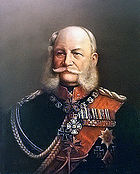
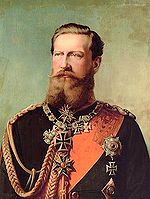
Parliamentary system
A parliamentary system is a system of government in which the ministers of the executive branch get their democratic legitimacy from the legislature and are accountable to that body, such that the executive and legislative branches are intertwined....
, democratic freedoms
Democracy
Democracy is generally defined as a form of government in which all adult citizens have an equal say in the decisions that affect their lives. Ideally, this includes equal participation in the proposal, development and passage of legislation into law...
, peace, and equal rights
Civil rights
Civil and political rights are a class of rights that protect individuals' freedom from unwarranted infringement by governments and private organizations, and ensure one's ability to participate in the civil and political life of the state without discrimination or repression.Civil rights include...
for non-German nationalities, including Poles, within the German Empire
German Empire
The German Empire refers to Germany during the "Second Reich" period from the unification of Germany and proclamation of Wilhelm I as German Emperor on 18 January 1871, to 1918, when it became a federal republic after defeat in World War I and the abdication of the Emperor, Wilhelm II.The German...
.
Szweykowski points out that the "Legend's" contrast between the despotic centenarian Pharaoh Ramses and his humane grandson and successor Horus was, in its historic German prototype
Prototype
A prototype is an early sample or model built to test a concept or process or to act as a thing to be replicated or learned from.The word prototype derives from the Greek πρωτότυπον , "primitive form", neutral of πρωτότυπος , "original, primitive", from πρῶτος , "first" and τύπος ,...
s, doubled, with Prince Frederick actually facing two antagonists: his father, Kaiser Wilhelm I, and the "Iron Chancellor", Otto von Bismarck
Otto von Bismarck
Otto Eduard Leopold, Prince of Bismarck, Duke of Lauenburg , simply known as Otto von Bismarck, was a Prussian-German statesman whose actions unified Germany, made it a major player in world affairs, and created a balance of power that kept Europe at peace after 1871.As Minister President of...
. In a curious further parallel, a month after Kaiser Wilhelm's illness, Bismarck suffered a stroke
Stroke
A stroke, previously known medically as a cerebrovascular accident , is the rapidly developing loss of brain function due to disturbance in the blood supply to the brain. This can be due to ischemia caused by blockage , or a hemorrhage...
.
Bolesław Prus, who in his "Weekly Chronicles" frequently touched on political events in Germany, devoted much of his December 4, 1887, column to Prince Frederick and his illness. The latest news from Germany and from San Remo
Sanremo
Sanremo or San Remo is a city with about 57,000 inhabitants on the Mediterranean coast of western Liguria in north-western Italy. Founded in Roman times, the city is best known as a tourist destination on the Italian Riviera. It hosts numerous cultural events, such as the Sanremo Music Festival...
, Italy, where the Prince was undergoing treatment, had been encouraging. Prus wrote with relief that "the Successor to the German Throne reportedly does not have cancer." By mid-December, however, the politically-inspired optimism in the Berlin press had again yielded to a sense of despair.
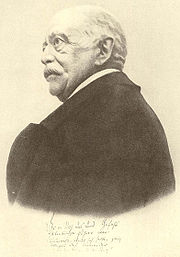
Perspective (cognitive)
Perspective in theory of cognition is the choice of a context or a reference from which to sense, categorize, measure or codify experience, cohesively forming a coherent belief, typically for comparing with another...
s that generalized a particular fact to all human life; the atmosphere of legend
Legend
A legend is a narrative of human actions that are perceived both by teller and listeners to take place within human history and to possess certain qualities that give the tale verisimilitude...
was particularly favorable to this.
"In putting Horus to death while Prince Frederick still lived, Prus anticipated events, but he erred only in details, not in the essence of the matter, which was meant to document the idea that 'human hopes are vain before the order of the world.' Frederick, to be sure, did mount the throne (as Frederick III) in March the following year (Kaiser Wilhelm I died on March 9, 1888) and for a brief time it seemed that a new era would begin for Germany, and indirectly for Europe."
But it was not to be. Frederick III survived his father by only 99 days, dying at Potsdam
Potsdam
Potsdam is the capital city of the German federal state of Brandenburg and part of the Berlin/Brandenburg Metropolitan Region. It is situated on the River Havel, southwest of Berlin city centre....
on June 15, 1888, and leaving the German throne to his bellicose son Wilhelm II, who a quarter-century later would help launch World War I.
The connection between the German dynastic events and the genesis of Prus' "Legend of Old Egypt" was recognized in the Polish press already in 1888, even before Frederick's accession to short-lived impotent power, by a pseudonymous writer who styled himself "Logarithmus."
As Szweykowski observes, "the direct connection between the short story and political events in contemporaneous Germany doubtless opens new suggestions for the genesis of Pharaoh."
Influences
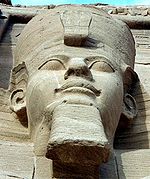
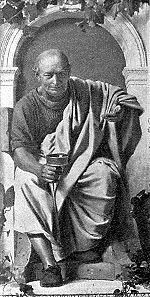
- the use of a device inspired by the ancient Greek chorusGreek chorusA Greek chorus is a homogenous, non-individualised group of performers in the plays of classical Greece, who comment with a collective voice on the dramatic action....
, in this case stating at the opening and at the end, and repeating once in the course of the text, a sentiment about the vanity of human hopes before the decrees of heaven; - astrologicalAstrologyAstrology consists of a number of belief systems which hold that there is a relationship between astronomical phenomena and events in the human world...
echoes from Prus' own newspaper account of the solar eclipseSolar eclipseAs seen from the Earth, a solar eclipse occurs when the Moon passes between the Sun and the Earth, and the Moon fully or partially blocks the Sun as viewed from a location on Earth. This can happen only during a new moon, when the Sun and the Moon are in conjunction as seen from Earth. At least...
that he had witnessed at Mława, north of WarsawWarsawWarsaw is the capital and largest city of Poland. It is located on the Vistula River, roughly from the Baltic Sea and from the Carpathian Mountains. Its population in 2010 was estimated at 1,716,855 residents with a greater metropolitan area of 2,631,902 residents, making Warsaw the 10th most...
, four months earlier, on August 19, 1887; - the history of PharaohPharaohPharaoh is a title used in many modern discussions of the ancient Egyptian rulers of all periods. The title originates in the term "pr-aa" which means "great house" and describes the royal palace...
Ramses II ("the Great"), who had lived nearly as long as the "Legend's" "hundred-year-old Ramses" (who is also referred to in Prus' story as "great Ramses") and had outlived dozens of his own potential successorOrder of successionAn order of succession is a formula or algorithm that determines who inherits an office upon the death, resignation, or removal of its current occupant.-Monarchies and nobility:...
s; - and the RomanRomeRome is the capital of Italy and the country's largest and most populated city and comune, with over 2.7 million residents in . The city is located in the central-western portion of the Italian Peninsula, on the Tiber River within the Lazio region of Italy.Rome's history spans two and a half...
poetPoetA poet is a person who writes poetry. A poet's work can be literal, meaning that his work is derived from a specific event, or metaphorical, meaning that his work can take on many meanings and forms. Poets have existed since antiquity, in nearly all languages, and have produced works that vary...
HoraceHoraceQuintus Horatius Flaccus , known in the English-speaking world as Horace, was the leading Roman lyric poet during the time of Augustus.-Life:...
's sentiment, "Non omnis moriar" ("I shall not die altogether"), which Prus cites in Polish in the "Legend" and will cite in the original LatinLatinLatin is an Italic language originally spoken in Latium and Ancient Rome. It, along with most European languages, is a descendant of the ancient Proto-Indo-European language. Although it is considered a dead language, a number of scholars and members of the Christian clergy speak it fluently, and...
at the end of The DollThe Doll (novel)The Doll is the second of four major novels by the Polish writer Bolesław Prus. It was composed for periodical serialization in 1887-89 and appeared in book form in 1890....
, which he is also writing just then.
Characters
For Prus it was axiomAxiom
In traditional logic, an axiom or postulate is a proposition that is not proven or demonstrated but considered either to be self-evident or to define and delimit the realm of analysis. In other words, an axiom is a logical statement that is assumed to be true...
atic that historical fiction
Historical fiction
Historical fiction tells a story that is set in the past. That setting is usually real and drawn from history, and often contains actual historical persons, but the principal characters tend to be fictional...
must distort history. Characteristically, at times, in historical fiction, his choices of characters' names show considerable arbitrariness: nowhere more so than in "A Legend of Old Egypt."
- The protagonist is assigned the name of the hawk-headed EgyptEgyptEgypt , officially the Arab Republic of Egypt, Arabic: , is a country mainly in North Africa, with the Sinai Peninsula forming a land bridge in Southwest Asia. Egypt is thus a transcontinental country, and a major power in Africa, the Mediterranean Basin, the Middle East and the Muslim world...
ian god HorusHorusHorus is one of the oldest and most significant deities in the Ancient Egyptian religion, who was worshipped from at least the late Predynastic period through to Greco-Roman times. Different forms of Horus are recorded in history and these are treated as distinct gods by Egyptologists...
; - Horus' mother, the GreekGreek languageGreek is an independent branch of the Indo-European family of languages. Native to the southern Balkans, it has the longest documented history of any Indo-European language, spanning 34 centuries of written records. Its writing system has been the Greek alphabet for the majority of its history;...
variant of the name of the BiblicalBibleThe Bible refers to any one of the collections of the primary religious texts of Judaism and Christianity. There is no common version of the Bible, as the individual books , their contents and their order vary among denominations...
MosesMosesMoses was, according to the Hebrew Bible and Qur'an, a religious leader, lawgiver and prophet, to whom the authorship of the Torah is traditionally attributed...
' wife, Sephora (Exodus 2:21); - Horus' teacher, the name of MosesMosesMoses was, according to the Hebrew Bible and Qur'an, a religious leader, lawgiver and prophet, to whom the authorship of the Torah is traditionally attributed...
' father-in-law, JethroJethroIn the Old Testament or the Hebrew Bible, Jethro |Shu-ayb]]) is Moses' father-in-law, a Kenite shepherd and priest of Midian. He is also revered as a prophet in his own right in the Druze religion, and considered an ancestor of the Druze.-In Exodus:...
(Exodus 3:1); and - Horus' beloved, a GreekGreeceGreece , officially the Hellenic Republic , and historically Hellas or the Republic of Greece in English, is a country in southeastern Europe....
name that means "bearer of victory", BereniceBereniceBerenice or Berenike is the Ancient Macedonian form for Attic Greek Φερενίκη , meaning "bearer of victory", from φέρω "to bear" + νίκη "victory". Berenika priestess of Demeter in Lete ca. 350 BC is the oldest epigraphical evidence. The name also has the form Bernice...
(there were several Egyptian queens of that name in the Ptolemaic periodPtolemaic dynastyThe Ptolemaic dynasty, was a Macedonian Greek royal family which ruled the Ptolemaic Empire in Egypt during the Hellenistic period. Their rule lasted for 275 years, from 305 BC to 30 BC...
).
Pharaoh
"A Legend of Old Egypt," published in 1888, shows unmistakable kinships in settingSetting (fiction)
In fiction, setting includes the time, location, and everything in which a story takes place, and initiates the main backdrop and mood for a story. Setting has been referred to as story world or milieu to include a context beyond the immediate surroundings of the story. Elements of setting may...
, theme
Theme (literature)
A theme is a broad, message, or moral of a story. The message may be about life, society, or human nature. Themes often explore timeless and universal ideas and are almost always implied rather than stated explicitly. Along with plot, character,...
and denouement with Prus' 1895 novel Pharaoh
Pharaoh (novel)
Pharaoh is the fourth and last major novel by the Polish writer Bolesław Prus . Composed over a year's time in 1894–95, it was the sole historical novel by an author who had earlier disapproved of historical novels on the ground that they inevitably distort history.Pharaoh has been described...
, for which the short story served as a preliminary sketch.
Both works of fiction are set in ancient Egypt
Ancient Egypt
Ancient Egypt was an ancient civilization of Northeastern Africa, concentrated along the lower reaches of the Nile River in what is now the modern country of Egypt. Egyptian civilization coalesced around 3150 BC with the political unification of Upper and Lower Egypt under the first pharaoh...
— the "Legend," at some indeterminate time, presumably during the 19th or 20th Dynasty, when all the Ramesside pharaohs reigned; Pharaoh
Pharaoh (novel)
Pharaoh is the fourth and last major novel by the Polish writer Bolesław Prus . Composed over a year's time in 1894–95, it was the sole historical novel by an author who had earlier disapproved of historical novels on the ground that they inevitably distort history.Pharaoh has been described...
, at the fall of the 20th Dynasty and New Kingdom
New Kingdom
The New Kingdom of Egypt, also referred to as the Egyptian Empire is the period in ancient Egyptian history between the 16th century BC and the 11th century BC, covering the Eighteenth, Nineteenth, and Twentieth Dynasties of Egypt....
in the 11th century BCE.
In each, the protagonist (Horus, and Ramses XIII, respectively) aspires to introduce social reforms. (Ramses also plans preventive war
Preventive war
A preventive war or preventative war is a war initiated to prevent another party from attacking, when an attack by that party is not imminent or known to be planned. Preventive war aims to forestall a shift in the balance of power by strategically attacking before the balance of power has a chance...
against a rising Assyria
Assyria
Assyria was a Semitic Akkadian kingdom, extant as a nation state from the mid–23rd century BC to 608 BC centred on the Upper Tigris river, in northern Mesopotamia , that came to rule regional empires a number of times through history. It was named for its original capital, the ancient city of Assur...
n power.)
In each, the protagonist perishes before he can implement his plans — though, in the novel, some of these are eventually realized by Ramses' adversary and successor, Herihor
Herihor
Herihor was an Egyptian army officer and High Priest of Amun at Thebes during the reign of Pharaoh Ramesses XI although Karl Jansen Winkeln has argued that Piankh preceded Herihor as High Priest at Thebes and that Herihor outlived Ramesses XI before being succeeded in this office by Pinedjem I,...
.
See also
- PharaohPharaoh (novel)Pharaoh is the fourth and last major novel by the Polish writer Bolesław Prus . Composed over a year's time in 1894–95, it was the sole historical novel by an author who had earlier disapproved of historical novels on the ground that they inevitably distort history.Pharaoh has been described...
(historical novelHistorical novelAccording to Encyclopædia Britannica, a historical novel is-Development:An early example of historical prose fiction is Luó Guànzhōng's 14th century Romance of the Three Kingdoms, which covers one of the most important periods of Chinese history and left a lasting impact on Chinese culture.The...
by Bolesław Prus). - "Mold of the EarthMold of the Earth"Mold of the Earth" is one of the shortest micro-stories by the Polish writer Bolesław Prus.The story was published on 1 January 1884 in the News Year's Day issue of the Warsaw Courier . The story comes from a several years' period of pessimism in the author's life...
" (a micro-story by Bolesław Prus). - "The Living Telegraph" (a micro-story by Bolesław Prus).
- "ShadesShades (story)"Shades" is one of Bolesław Prus' shortest micro-stories. Written in 1885, it comes from a several years' period of pessimism in the author's life caused partly by the 1883 failure of Nowiny , a Warsaw daily that he had been editing less than a year...
" (a micro-story by Bolesław Prus). - Prose poetryProse poetryProse poetry is poetry written in prose instead of using verse but preserving poetic qualities such as heightened imagery and emotional effects.-Characteristics:Prose poetry can be considered either primarily poetry or prose, or a separate genre altogether...

